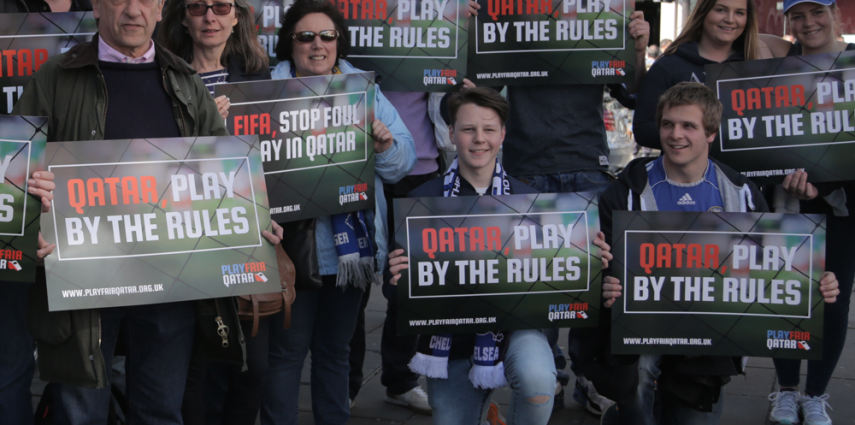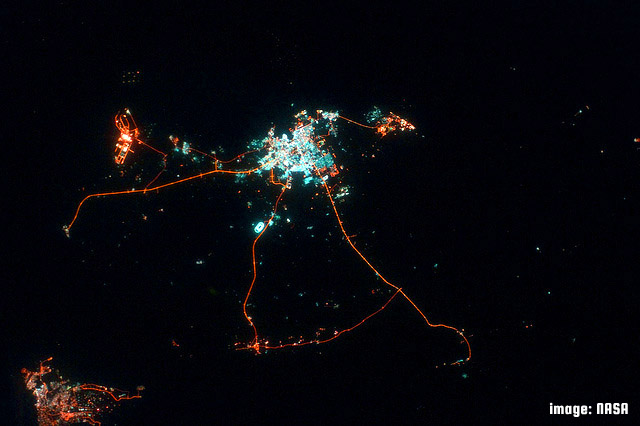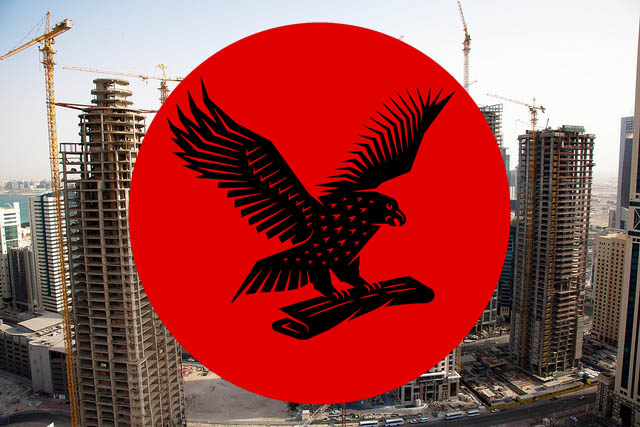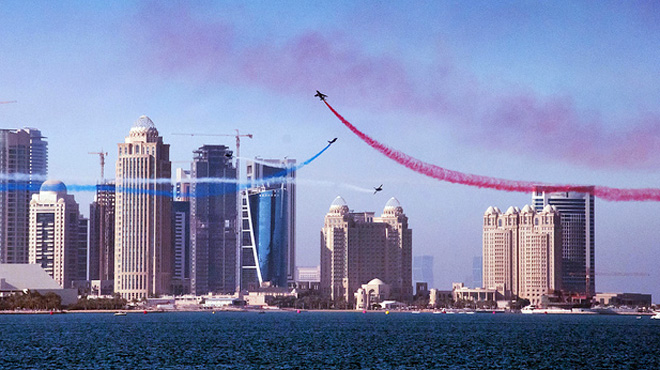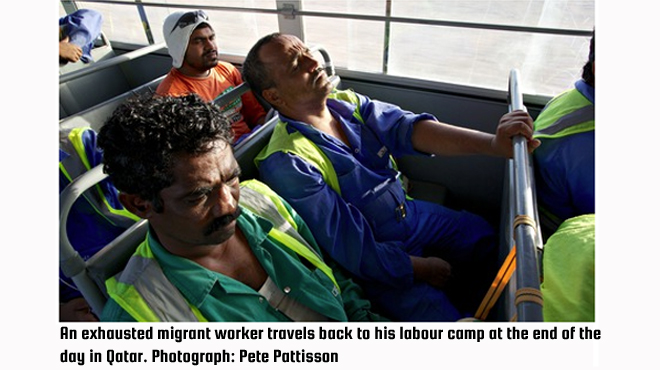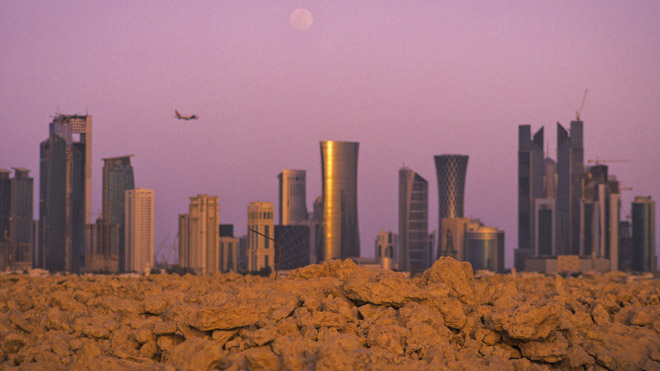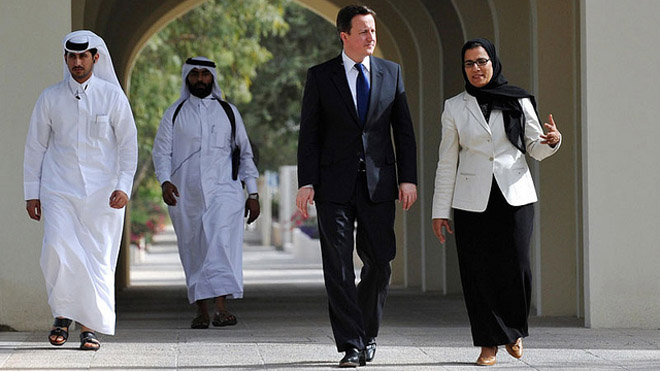It’s a strange tactic to take the anniversary of a promise you didn’t keep to make exactly the same promise. One year ago, with great fanfare, Qatar’s government promised the world that kafala – their sponsorship system that essentially leaves workers owned by their employers – would be abolished as part of “far-reaching labour market reforms”. The promises were so vague that at the time that one critic dismissed it as “an announcement of announcement”. That leaves this week’s statement as a re-announcement of an announcement of an announcement.
Kafala is the bedrock of abuse in Qatar, where the ITUC estimates that more than 4,000 workers will die before the start of the 2022 World Cup. Although there are many other faults, and abolishing kafala would only begin the process of ending them, the sponsorship system overrides even those few rights that workers are supposedly entitled to. For as long as employers control people’s freedom to leave the country (as kafala allows them) they will always have all the power.
The re-announcement of the intention to abolish kafala comes with all the same flaws as last year – there’s no real timetable attached to the “promise” and it’s clear that the legislation is still being looked at by the body most likely to strike it down, the Shura council (which has strong business representation). It doesn’t fully abolish the employer-controlled exit visa, and it would still be very difficult for workers to leave an abusive boss for a better one. Last year Amnesty International called the proposed kafala reforms a “missed opportunity”. This year it feels as though Qatar has been lining up an open goal for the past 12 months and has still managed to hit the post.
“Qatar is a regime intent on changing the subject rather than changing its rules.”
In that there is anything positive about today’s inaction replay it is solely that Qatar feels under enough pressure to at least pretend to be taking workers’ rights seriously, but the “avalanche of media disclosures that suggest massive violation of world soccer body FIFA’s bidding rules” as MideastSoccer blogger James Dorsey writes, suggests a regime intent on changing the subject rather than changing its rules.
There is no evidence that Qatar is serious about real change to protect the people preparing the country to host football’s premier tournament. Indeed to listen to Hassan Al-Thawadi speak, head of Qatar’s World Cup “Supreme Committee”, you would think everything was already fixed: “the… stadium projects that we are responsible for, there have been no fatalities and no major injuries as well.” He knows it will be some time before anyone can contradict him, as Qatar doesn’t care enough to keep records of migrant worker fatalities. The figures we work with come via the Indian and Nepalese governments, who at least keep track of the fate of their people.
If Qatar was serious about demonstrating improvements for migrant workers, it would surely welcome all independent scrutiny. In reality, Qatar seems to be prepared to go to great lengths to prevent anyone being able to confirm that those improvements exist.
At the International Labour Organisation (ILO), the UN Agency through which Employers, Workers and Governments negotiate international rights for workers, Qatar appears to have been engaged in a frenzied lobbying exercise to prevent it from sending observers to assess conditions for migrants. Faced with an ILO vote on whether to send a four-person committee with a remit to see what was happening in the country, the Gulf state responded by claiming to have revolutionised health & safety and to be cracking down on employers breaking the law.
These claims were hotly contested, and Qatar’s failures were considered enough to unite even the USA and Russia in calling for further investigation, but some other governments – perversely including countries like Pakistan and India with large populations in Qatar – lined up in its defence.
As Sam Gurney, the UK’s Worker Representative on the ILO Governing Body, said:
“There was a sense of shock and outrage at the sight of representatives of countries, where people are dying every week, defending Qatar in the face of all available evidence and what they must know about the fate of their citizens.”
Having ensured that the international community was kept at arm’s length, Qatar has turned on the media. Today we learn that a TV crew:
…”From West German Broadcasting was arrested… during a shoot with workers in the Qatari capital Doha, then interrogated by the State Security, brought before the prosecution and released only after another 14 hours. … The camera equipment, laptops and personal mobile phones were confiscated and – contrary to other commitments given to the German Embassy in Qatar – returned only with a four-week delay. All data had been deleted and pieces of equipment damaged.”
(If you read German, there’s more here).
These are not the actions of the regime proud of its transformative record on workers’ rights, but of one terrified that it’s losing control. If Qatar wants to distract us from the ever-returning boomerang of corruption allegations, it should try – among other things – abolishing the kafala exit visa and allowing workers to join trade unions. That would get our full attention.
Instead, it’s hard to believe that we’re still to see any substantive reforms after years of promises. Qatar wants this contest to drift into extra time, but with 40 workers dying every month, we’re sick of the time-wasting. That’s why we’ll keep campaigning alongside football fans, like those from Chelsea Supporters’ Trust (above), and with unions and human rights organisations to force Qatar to give us more than words.


